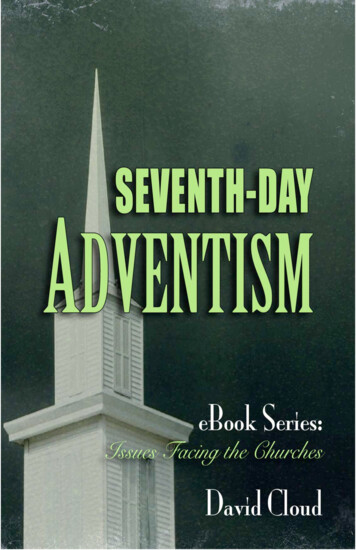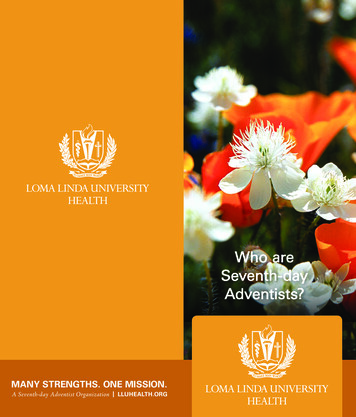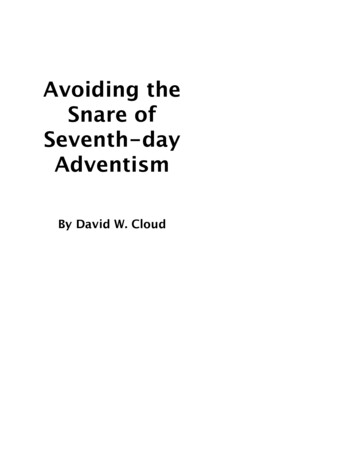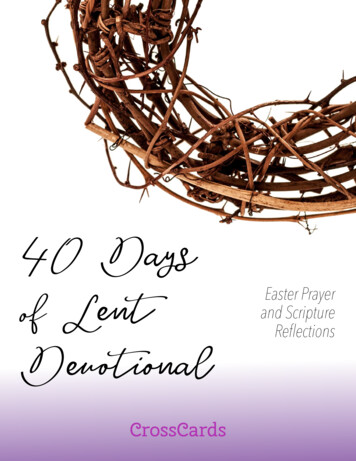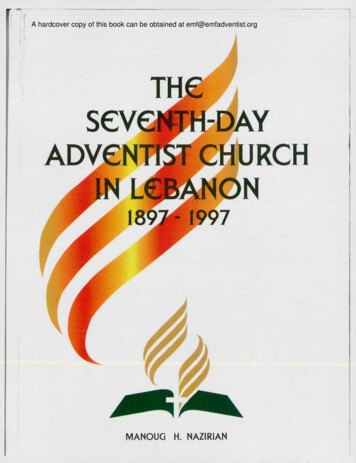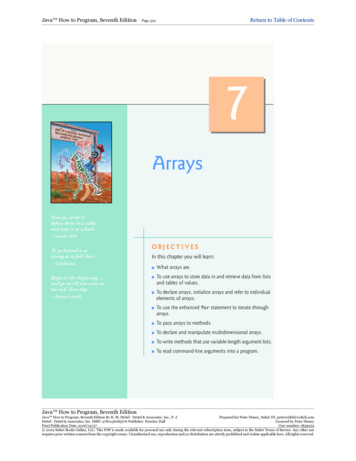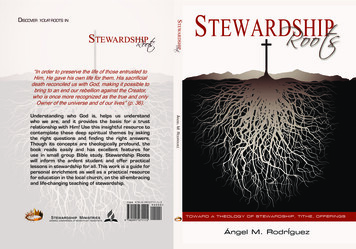
Transcription
StewardshipRootsStewardshipRootsDiscover your roots in“In order to preserve the life of those entrusted toHim, He gave his own life for them. His sacrificialdeath reconciled us with God, making it possible tobring to an end our rebellion against the Creator,who is once more recognized as the true and onlyOwner of the universe and of our lives” (p. 36).Á ngel M. R odríguezUnderstanding who God is, helps us understandwho we are, and it provides the basis for a trustrelationship with Him! Use this insightful resource tocontemplate these deep spiritual themes by askingthe right questions and finding the right answers.Though its concepts are theologically profound, thebook reads easily and has excellent features foruse in small group Bible study. Stewardship Rootswill inform the ardent student and offer practicallessons in stewardship for all. This work is a guide forpersonal enrichment as well as a practical resourcefor education in the local church, on the all-embracingand life-changing teaching of stewardship.
ivWritten by Ángel Manuel Rodríguez, ThDEdited by Patricia Valentino 1994Publication number STW 1050. A Department of Church Ministries publication.2013 Reprinted and redesigned.Publication number STW 1050. A Stewardship Ministries Department publication.ISBN 978-0-9912711-1-5This material may be translated, printed, or photocopied by any Seventh-day Adventist entity withoutsecuring further permission. Republished documents must include the credit line: “StewardshipMinistries Department, General Conference of Seventh-day Adventists, used with permission.” Sellingthis work for profit is prohibited.Scriptural references are from the Holy Bible, New International Version. Copyright 1984 InternationalBible Society. Used by permission of Zondervan Bible Publishers.Stewardship Ministries DepartmentGeneral Conference of Seventh-day Adventists12501 Old Columbia PikeSilver Spring, MD 20904, ardship.comwww.Facebook.com/Dynamicstewards
vFOREWORDStewardship Roots is a reprint of an earlier publication by the GeneralConference Church Ministries Department under the same title by Dr.Ángel Rodríquez, associate director of the Biblical Research Instituteof the General Conference of Seventh-day Adventists at the time ofwriting.This resource provides the three papers that were prepared anddistributed soon after the Stewardship Summit and Consultation heldat Cohutta Springs, Georgia, United States of America, March 20-23,1994. At Cohutta Springs, Dr. RodrÍquez presented two papers—oneon the theology of tithe and the other on the theology of offerings. Thethird paper on the theology of stewardship was written after the summit,and all three documents are included here.With a renewed interest in Christian stewardship on the part of theGeneral Conference administration and a commitment to play a part inthe revival and reformation emphasis of the world church in the 20102015 quinquennium, the General Conference Stewardship MinistriesDepartment is pleased to reprint these documents and have themavailable for the benefit of God’s people globally. As a stewardshipresource, it is our prayer that the contents of this book will help churchmembers better understand stewardship from the perspective ofGod. More importantly, we hope that your personal spiritual life willbe enriched, your thinking stimulated; that you will find a new senseof appreciation for these important concepts of God’s kingdom as youdescribe your unique relationship with God.Erika F. PuniStewardship Ministries DirectorGeneral Conference of Seventh-day Adventists
viCONTENTSForewordvContentsvi1TOWARD A THEOLOGY OFSTEWARDSHIPIntroduction 10Aspects of the Nature of God11God “Was” 11God Is the Creator 12The Creator Is Incomparable12The Creator Is Transcendent13The Creator Is Immanent 13The Creator Is Owner 14God Is Love 15Aspects of Human Nature 16Humans Are Creatures 17Humans Are Made in God’s Image18A Physical Being 19A Spiritual Being 19An Intellectual Being 20A Social Being 20Humans and Dominion Over the World21The Fall and Sin 23Human FreedomSin as Rebellion: Claiming Ownership2325
viiSin as Selfishness and Enslavement26Salvation and Stewardship 27Christ: Image of God and Steward28Restoring the Stewards 29Restoration of the Image of God33Stewardship of Creation and Apocalypticism34Summary and Conclusions 35Follow-Through Discussion 37Endnotes 392STEWARDSHIPAND THETHEOLOGY OF TITHEIntroduction 42Tithing in the Old Testament43Genesis 14: Abraham’s Tithe 43Tithe Is Based on Income 44The Recipient of Tithe 45Theological Basis for Tithing45Genesis 28:10-22: Jacob’s Tithe47Jacob’s Commitment to God48God’s Concern for Jacob 48Jacob Makes a Vow 49Jacob Worshipped 50Tithing Legislation 51Leviticus 27:30-33 51Numbers 18:21-3253Deuteronomy 12:6, 11, 17; 14:22-29; 26:12-15 55
viiiOther Old Testament Passages562 Chronicles 31:4-6, 12 57Amos 4:4 57Nehemiah 10:38,39; 12:44; 35:5, 12 58Malachi 3:8-10 60Tithing in the New Testament62Summary and Conclusions 64Follow-Through Discussion 67Endnotes 693STEWARDSHIP AND THETHEOLOGY OF OFFERINGSIntroduction 72Offerings in the Old Testament72Sacrificial Expiatory Offerings73Sacrifices as Offerings 74Burnt Offerings (Leviticus 1:3-17)74Peace Offerings (Leviticus 1:3-17)76Other Offerings 77Special Offerings 78Offerings in the New Testament 81Jesus and Offerings82Offerings and Worship 82Offerings and Interpersonal Relationships82Offerings and Commitment to the Lord83
ixOfferings and True Benevolence 84Offerings and Christian Ministry 84Paul and Offerings 85Paul’s Reluctance to Accept Offerings85Paul as the Recipient of Offerings 87Paul and the Collection: A Special Offering89Motivation for Giving 89Planned Giving 91Attitude Toward Giving 92Purpose of the Collection 93Offerings in Acts 95Offering for the Poor95Special Offerings 98Summary and Conclusions 98Follow-Through Discussion 105Endnotes 107
10STEWARDSHIP ROOTS1TOWARD A THEOLOGY OFSTEWARDSHIPIntroductionHumans are inquisitive creatures involved in a constant searchfor meaning. This obsession with meaning is not simply an attemptto understand the functional and structural unity of the universe; butrather, a disturbing concern to discover purpose for their existence.Very few things tend to raise a keen sense of interest in humans morethan their insatiable curiosity in finding the reason for their existence.Biblical theology informs us that our origin is located in a divineact of creation and that we were placed on this planet by a lovingCreator. He filled our lives with meaning by (among other things)allowing us to assist Him in the administration of the planet. The biblicalconcept of stewardship is in essence an attempt to clarify the questionof purpose for our lives by providing a particular self-understandingbased on a personal relationship with the Creator and Redeemer of thehuman race.In this document we will examine the theological significanceof this concept and the place of this self-understanding within biblicaltheology. What are the theological roots that nurture the concept ofstewardship? How is stewardship related to the biblical view of God,and redemption through Christ? We will explore the theological rootsthat provided the womb within which this perspective and understandingof human existence were conceived and preserved.There are at least four main lines of analysis to be pursuedin a search for the theological foundation of stewardship, which are:(1) the nature of God, (2) the nature of humans, (3) the Fall and sin,and (4) salvation. We will briefly examine them from the perspective ofstewardship.
1 TOWARD A THEOLOGY OF STEWARDSHIP11Aspects of the Nature of GodThe nature of God is shrouded in mystery. Philosophers andtheologians have tried to penetrate this mystery with very little, if any,success. God’s self-revelation in the Scriptures has shed some light onour understanding of His nature, but it continues to be, and will remain,beyond our full comprehension. Let us look at some aspects of God’sself-revelation from the perspective of stewardship.God WasWhenever the Bible takes us to the very origin and beginning ofthe universe, several theological statements are implicitly or explicitlymade. One of the most important is that God “was.” This is implicitin Genesis 1:1: “In the beginning God created.” He was, before Hecreated. In John 1:1 this concept is explicitly stated: “In the beginningwas the Word.” Before anything was brought into existence, Godalready was.This divine “wasness” means first, that God is eternal. Therewas never a time when God came into existence. If we ask what wasthere before the beginning, the answer provided by the biblical recordis “God.” If He was “there” before everything else was brought intoexistence, then it is impossible to posit a source through which Godcame into existence. There is no indication in the Scripture to the effectthat God “was” because something caused Him to be. The Bible doesnot speak of a beginning before the beginning. The fact that God “was”points to His eternal nature: He always “was.”Second, the divine “wasness” means that God is self-sufficient.Since before the beginning there was nothing else except God;therefore, He is self-sufficient. The Lord exists by Himself. A sourceof energy was never needed to feed the divine being except Himself.With respect to God, self-sufficiency means that He is self-existent. Weshould, therefore, agree with those who argue that God is existence inHimself. Life is not something that He possesses; but rather, what Heis.Self-sufficiency means that God is absolutely free andautonomous. Outside Himself there is nothing or no one to whom God
12STEWARDSHIP ROOTSshould submit. He is His own law. No one can impose obligations onHim or force Him to act in certain specific ways. He does not needanything from anyone because He is self-sufficient. John refers to Himas the “Lord God who is, and who was, and who is to come” (Revelation1:8; cf 1:4).The “wasness” of God that we have just described is probablyone of the deepest statements we find in Scripture about God,because it is the only one that describes Him for us in Himself, beforeanything else was brought into existence. A proper understanding ofstewardship should be based on the conviction that God is eternal andself-sufficient and that our administration of what He entrusted to usdoes not have the purpose of enriching Him in any way. Stewardshipoffers the opportunity to enter into fellowship with this mysterious Godwho existed from eternity.God Is the CreatorGod introduced Himself to us in the Scriptures as the Creator(Genesis 1:1). If we know that at the beginning He was, it is becausewe were informed that He was the Creator. God as Creator is “the mostfundamental conception we can have of God. That is, creation is thatactivity of God by means of which we define what we mean by the word God. ”1 Indeed, it would be impossible for us to talk about the mysteryof God—that He “was”—apart from the fact that He is the Creator. Ourvision of God expands itself when we look at Him as Creator of heavenand earth, and the entire universe.The Creator Is IncomparableGod as Creator means that there is no one like Him in thecreated universe. He is essentially different from His creation. He is theEternal One without beginning, but created beings have a beginning;He is self-existent, but created beings have a derived existence thatdepends upon proper ecological balances: water, sunlight, oxygen,etc. God is absolutely autonomous, but the creatures depend uponHim for their subsistence. Creatures are finite; only God is infinite inHimself.
1 TOWARD A THEOLOGY OF STEWARDSHIP13Isaiah confronted his people with this penetrating rhetoricalquestion from the lips of the Lord: “To whom will you compare me orcount me equal? To whom will you liken me that we may be compared?”(46:5). The questions are addressed to those tempted to idolatry. TheLord seems to be challenging His people: “Have you found anotherbeing like me in the created universe? If that is the case, I am readyto be compared to him or her.” Then He adds, “Remember the formerthings, those of long ago; I am God, and there is no other; I am God,and there is none like me” (Isaiah 46:9). Of the divine “species” thereis only one unique type. No one from within the created world canoccupy His place or claim equality with Him. The Lord is “a supreme,incomparably unique Being.” 2The Creator Is TranscendentGod as Creator means that He transcends the createduniverse; He is not part of it. According to Genesis 1, God createdthrough His word. Creation through the spoken word points to God asa transcendent being who mediates His creative activity through theword, while He remains outside creation. It is, therefore, absurd to lookfor God in the created world. He did not create it out of His essencebut through His word. Creation out of nothing denies the validity ofpantheism. The created universe is not permeated by the divine. God,the Creator, cannot be circumscribed by that which He created. Thisfact was recognized by Solomon during the dedication of the temple.During his prayer he said, “But will God really dwell on earth? Theheavens, even the highest heaven, cannot contain you” (1 Kings 8:27).The Creator Is ImmanentGod as Creator means that He is willing to enter into the createdworld. Scholars have pointed out that while Genesis 1 testifies to God’stranscendence, Genesis 2 testifies to His immanence. In Genesis 2,God is described as present within creation in full interaction with Adamand Eve.God’s immanence is indispensable for the preservation ofcreation. The preservation of God’s creation is directly dependent on
14STEWARDSHIP ROOTSHis care and concern for it. It is, therefore, indispensable for God toremain within His created world once His creative activity is completed.Divine rest on the seventh day points precisely to this significant fact(Genesis 2:2, 3).Genesis makes clear that creation belongs to the sphere ofspace and time. God transcends that sphere. However, He chose toenter into that sphere, into the world He created for His creatures. Hecreated a fraction of time within which He made Himself available toHis creation. Of course, God remained the Transcendent One. Hisimmanence does not deny His transcendence. God condescends toenter into His creation, making it clear that He has not abandoned it.The Creator Is OwnerGod as Creator means that He owns the universe and everythingin it. He is Lord over it and assigns specific tasks to each element ofcreation (e.g., Genesis 1:14, 26, 29; 2:15, 16). God’s ownership of theworld is based on His creative activity. The psalmist wrote: “The earthis the Lord’s, and everything in it, the world, and all who live in it; for hefounded it upon the seas and established it upon the waters” (24:1, 2).God declares, “Every animal of the forest is mine, and the cattle on athousand hills. I know every bird in the mountains, and the creaturesof the field are mine” (Psalm 50:10, 11). God is not only Owner of thematerial content of this world and of the living beings who populateit, but His ownership is cosmic: “The heavens are yours, and yoursalso the earth; you founded the world and all that is in it” (89:11). Thepsalmist knows that “the universe is in Yahweh’s hands. To him as theruler does the world belong.”3God as Creator is an indispensable concept in the formulationof the theology of stewardship. God’s incomparability, His uniqueness,identifies Him as the only One to whom we are accountable asstewards. The universe is not run by opposing forces to which we areequally obliged to serve. There is only one Creator, and He expects ourexclusive loyalty.God’s transcendence is a rejection of any attempt to base ourpractice of stewardship on pantheistic ideas. The natural world is not anextension or a manifestation of the divine. Pantheism cannot provide
1 TOWARD A THEOLOGY OF STEWARDSHIP15a theological foundation for the stewardship of the world, because it isrejected by Scripture.God’s immanence testifies to the fact that God’s creation is inconstant need of His care and concern in order to function harmoniously.The Creator is also the Sustainer of the world. God’s condescendingpresence in the world makes room for humans to participate with Himin the administration and preservation of His creation (e.g., Genesis2:15).God’s ownership as Creator should remind us constantly of thelimits of our function in the world. It is this aspect that defines, perhapsbetter than any other, the nature of a steward. He or she is never theowner, but the administrator.God Is LoveLove seems to be used in the Bible to define or describe theessence of God. John’s statement, “God is love” (1 John 4:7, 8), is oneof the most important descriptions of the nature of God in Scripture.The apostle made that statement in the context of Christ’s sacrificialdeath. According to him, the work of Christ reveals the very essenceof God: “He is love.” This love is self-giving and totally and absolutelyunselfish (e.g., John 3:16). There is nothing outside God that couldmove or force Him to love. In fact, there is no need for any externalmotivation, because it is God’s very nature to love. This love is “neitherbased on a felt need in the loving person nor on a desire called forth bysome attractive feature(s) in the loved one.”4 It was this understandingof God’s love that led Paul to say, “God demonstrates his own love forus in this: While we were still sinners, Christ died for us” (Romans 5:8).God is love means that every one of His actions originates withand is motivated by love. Election is based on His love (Deuteronomy7:7, 8) as well as redemption (Isaiah 43:4; 63:9). He loves not onlyHis people (Deuteronomy 33:3), but also the alien (10:18). Therevelation of God’s love reaches its deepest dimension of meaning inthe incarnation, ministry, death, and resurrection of Jesus. His love forsinners is not motivated by the misery of their sinful condition, but bythe fact that God is love, and it is this great fact that moves Him to lovesinners in spite of their sin.5 In order for God’s love to express itself,
16STEWARDSHIP ROOTSanother person is needed. Love occurs among individuals who receive,give, and respond. This raises the important question of the nature ofGod’s love before creation. Unselfish love is a possibility only if thereis another person to whom it can be expressed. Before creation, whenGod “was,” He was alone. Was His love then selfish? Was God’s naturealtered after He created intelligent creatures capable of receiving andgiving love? Christian theologians have given a resounding no as ananswer to those questions. The Bible tells of only one God who is love.Unselfish love, therefore, belongs to the eternal nature of God. Hisnature has not experienced change; He is what He has always been:“Love.”Christian theologians have rightly argued that unselfish lovefound eternal expression within God in the mystery of the Trinity.The relations between the Father, the Son, and the Holy Spirit wereconditioned by the essence of unselfish love, which was common toeach one of them (e.g., John 14:31; 5:20).6 Unselfish love requires anencounter of distinct persons, and that is exactly what we find in themystery of a triune God. Throughout eternity the Father loved the Sonand the Spirit, the Son loved the Father and the Spirit, and the Spiritloved the Father and the Son.7That same loving God brought the universe into existence.His eternal love moved Him to create: “The work of creation was amanifestation of His love.”8 Creation is good because it was broughtinto existence by a loving God (Genesis 1:31). Ultimate reality ispersonal and unselfish.A clear understanding of God’s love protects stewardshipfrom falling into a legalistic mode. A faithful steward is not one who isseeking to motivate God to love him or her. The love of God is eternaland defines the natural way He feels and acts toward His creation.Stewardship finds its motivating force and model in the unselfish andcaring love of God.Aspects of Human NatureIt is probably right to suggest that humans are the most intricateand mysterious creatures in the known universe. We, unlike any other
1 TOWARD A THEOLOGY OF STEWARDSHIP17created being on the planet, are capable of perceiving ourselves aswonderful and fascinating. The mystery of our presence in the universebecomes absolutely impenetrable if we ignore the information aboutour origin provided to us through God’s special revelation in Scripture.We should review some of that data.Humans Are CreaturesGenesis 1:27 states: “God created man . . . male and femalehe created them.” This is a statement of paramount importance in theformulation of a biblical anthropology. Humans are created beings; weare part of the created world. First, this means that we had a beginning.We are not eternal; we do not belong to the divine. Our mode ofexistence is essentially different from God’s. He always “was,” but wecame into existence. Our role within the universe is one of a createdbeing.Second, humans are finite beings. Their existence is derivedand in itself lacks self-sufficiency. We are not self-contained beingswho can produce our own source of existence to preserve ourselves.Since we were brought into existence, we can also be returned tonothingness, our existence can come to an end. However, althoughthe preservation of our existence is ultimately beyond ourselves, weare expected to work with the Creator in the preservation of our lives.We are, therefore, stewards of life.Third, viewing humans as creatures means that they existwithin time and space. Both of those elements are indicated in thecreation narrative. Adam and Eve were created on the sixth day, duringa particular fraction of time. They were time-conditioned from the verybeginning. They were brought into existence within a particular place—namely, the garden. Obviously, the space is really the rest of the createdworld. Their home was the flora and fauna, the rest of the universe. Ifthe space where we exist is ruined, our existence is jeopardized. Thestewardship of creation is of vital importance.Humans live within time. Events and actions succeed eachother; what was belongs to the past, and it is impossible for us to goback and relive it. Only the present is, and it lasts just fractions ofseconds because it is constantly transmuted into the past. We always
18STEWARDSHIP ROOTShave the future, what is not yet. Since there is future time, humans livein hope, constantly facing the challenge of self-development. Time is,therefore, one of the most important aspects of the created universe.Time forms, changes, and modifies us. The way we use it determinesto a large extent whom we become. The proper administration of timeis undoubtedly one of our most serious responsibilities. Living withintime and space is not a limitation but rather the mode of our existenceand provides us with freedom to move within that continuum in order tobe what we may choose to be.Finally, to be a created being means that we are not the result ofimpersonal forces within the created world, but the result of a creativeact of love. Our existence is a manifestation of God’s selfless love,an act of grace. We were created by Him, because in His love Godsaw that this was good. Divine love, grace, and freedom brought intoexistence an intelligent creature who was part of the created world andyet different. This creature was capable of receiving and returning love.Humans Are Made in God’s ImageThe uniqueness of the human race is located in the fact thatwe were created in God’s image (Genesis 1:27). The creation of Adamand Eve does not follow the same pattern used by God in the creationof the world. He spoke, and the natural world came into existence. Inthis particular case, speech preceded existence. In the case of Adamand Eve, the spoken word is not present. God’s voice addressed themonly after their creation (Genesis 1:29, 30; 2:16). They were singledout by God as objects of His speech. (In other words, humans arecreatures to whom God can relate, whom He can address as persons.)Only they, within the created world, could relate to God in personalterms. This aspect of our human nature makes it possible for us to bepartners with God in stewardship.For centuries theologians have discussed the meaning of theimage of God in humans. Different suggestions have been given, buttoday there seems to be a general agreement on the belief that theimage of God is not something that we have but something that weare.9 God’s image in us is not located in one aspect of our personalitybut in the totality of our being. At creation, God’s image was reflected in
1 TOWARD A THEOLOGY OF STEWARDSHIP19every aspect of Adam and Eve. We will explore some of these aspectsfrom a wholistic point of view.A Physical BeingThe first thing we notice about a human being is that he or sheis a physical structure that can be perceived by the eye and touched byothers. If the whole person was created in God’s image, the physicalbody should also express it: “In the beginning, man was created in thelikeness of God, not only in character, but in form and feature.”10The very fact that God created us as physical entities indicatesthat the human body is good, thus rejecting Greek anthropologicaldualism, which denies the value of the human body. The preservationof the body is a dual responsibility of God and people. He providedeverything Adam and Eve needed to preserve their bodies in perfectcondition, and assigned them a specific diet that they were expected toconsume (Genesis 1:29).The stewardship of our bodies is based on the fact that Godcreated us as physical beings. Our bodies are not something we havebut something we are.11 Our bodies and what we are, are inseparable.God expects us to administer them to His glory (1 Corinthians 6:20).A Spiritual BeingHumans are more than matter. We have the capacity to listento God and to answer back. Apparently, no other creature on thisplanet seems to have that ability. There is a communality of languagebetween God and humans that makes it possible for them to enter intofellowship and to establish a meaningful relationship.Humans are essentially religious persons. We come tounderstand ourselves particularly in terms of our relationship with God.The first relationship Adam and Eve established was with their Creator.When Adam was created, Eve was not present; and when she wascreated, he was not present. The first image each one of them capturedwas the one of the Creator. Every other relationship was determinedby that primary one, and apart from it they would not have been able tounderstand themselves or the rest of creation.
20STEWARDSHIP ROOTSBut the encounter between God and humans was not goingto be restricted to the moment of creation. They needed God fortheir subsistence and for the satisfaction of the need of a personalrelationship with Him. Hence, the transcendental God decided toremain with them in time and space. It is in God’s gracious willingnessto come and dwell with us that the stewardship of our spiritual life wasoriginally born.An Intellectual BeingGod gave Adam and Eve rational abilities through which theycould derive a deeper understanding of Him, themselves, and thecreated world. Through fully sanctified reason, humans were going tobe able to control their emotions and passions, to learn, and to developall kind of skills.In the Garden of Eden God assigned Adam work that requiredthe use of his intellectual capacities (Genesis 2:15). Particularly, Godasked Adam to assign names to the animals (2:19, 20). In the Biblea name is an extremely important matter, because it is a reflection ofthe character of the person who bears it. Giving names to the animalsimplies that Adam was to observe and analyze their behavior in orderto name them properly. This was a scientific study of nature. He wasexploring God’s creation, systematizing it, understanding its order andharmony. He was putting the skills and talents God had given him atthe service of God and of nature. It is there that the theological basis forthe stewardship of our talents is to be located. God endowed us withthe capacity to develop skills and to acquire new knowledge, and thesewere to be put into His service.A Social BeingHumans cannot exist meaningfully in total isolation. Ourcapacity to interact with others is a manifestation of the fact that wewere created by God in His image. It has been suggested that Genesis1:27 points to that aspect of the image of God in us: “God createdman in his own image, in the image of God he created him; male andfemale he created them.” “Man” is a plurality of persons, a unity formed
1 TOWARD A THEOLOGY OF STEWARDSHIP21by a female and a male. Some scholars have located in that pluralitya manifestation of the image of God. Male and female are the image,because they together are one.12 A plurality defines “man” and God.The basic idea is that the image of God in “man” includes a pluralitythat allows for inter-human relations in a “similar” way that the pluralityin God makes possible intra-trinitarian relations. Humans, like God, arerelational beings, because true love always needs another person toexpress itself.Apart from our relationship with God, one of the most importantsocial interactions takes place within the family structure. God instructedAdam and Eve about this fundamental relationship, describing forthem the nature of marriage. Marriage has a unitive (Genesis 2:24)and a procreative purpose (1:28). Unity in love can reach its fullestdimension within marriage. At the same time, God gave humans theprivilege to contribute with
of God—that He "was"—apart from the fact that He is the Creator. Our vision of God expands itself when we look at Him as Creator of heaven and earth, and the entire universe. The Creator Is Incomparable God as Creator means that there is no one like Him in the created universe. He is essentially different from His creation. He is the

![Welcome [dashdiet.me]](/img/17/30-day-weight-loss-journal.jpg)
